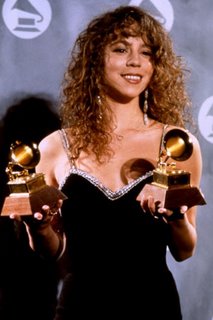Debunking the Octave Myth

Hello all... first, some housekeeping notes as I keep learning about the blog-o-sphere.
(1) I will update my blog at least three times a week (Sunday-Saturday) and possibly more. I'm feeling a smidge guilty about having taken several days since my last post, but that's the critic's life. Always at the theater, rarely at my computer! But have no fear... there will be bloggy goodness every week.
(2) And soon I will finally start putting audio clips up here. I've just got to sit down and teach myself to do it. Listen out for it!
(As opposed to "look out for it." The wit comes free around this blog, y'all).
And now... on with the show:
For those of you who don't know him, my boyfriend Andrew teaches singing to many talented performers, and he teaches me many things about music. Through him, I've learned that declarations about a singer's vocal range are often... innacurate.
 Take Mariah Carey, who no doubt wishes there were no photographic records of the humidity-perm she rocked in the 90s.
Take Mariah Carey, who no doubt wishes there were no photographic records of the humidity-perm she rocked in the 90s.It was once widely reported that she has a seven-octave vocal range. That notion even surfaced in respected publications like Salon.com (just check the ninth line of the last paragraph of this review).
But as Andrew has pointed out, it is impossible for a person to have a range so broad. "That would mean her highest note was something only dogs could hear!" he recently exclaimed, and then he tried to make a dog-whistle sound. He scrunched up his face and let out a whispery, screechy noise that did not attract local animals but did make him look goofy and cute.
Anyway, his statement is backed up by this report on Snopes, a website dedicated to debunking urban legends.
And yet the idea persists. In fact, Andrew is dubious that Carey has even a five octave range. Honestly, I don't know, and when I looked up "octave" on Wikipedia, the entry didn't clear things up for me. (Damn you, free-for-all publishing! Why don't you have exacting scholarly standards?)
But the point is that "octave" is one of those terms that gets tossed around glibly by lots of people--myself included, I'll admit--because we know just enough about it to use it incorrectly.
 Another example is in some of the press given to Felicity Huffman for her Oscar-worthy turn in "Transamerica" (Sorry, Reese. Huffster got robbed.)
Another example is in some of the press given to Felicity Huffman for her Oscar-worthy turn in "Transamerica" (Sorry, Reese. Huffster got robbed.)Articles like this one from London's Observer casually reference how the actress changed the octave of her voice. Really? Now I'm dubious.
It seems to me that the press (and a great swath of the public) has adopted the word "octave" because it sounds schooled and therefore gives an argument the false appearance of scholarship.
I'm sure, for instance, that I said the following at some college party:
"Well, Mariah Carey's music may sound a little processed, but you can't deny she's got an amazing voice. It's seven octaves!"
And see... bam. I've made my point with some wicked-fancy terminology. Point, set, match.
But let's make "I Totally Hear That" a place of truth. I still don't really know what I'm talking about. I just know I have more to learn. Can anyone else help clarify this "octave" business?
Andrew? Bueller? Mariah?
Labels: Pop

14 Comments:
I'm no musical scholar, but I did take piano and cello lessons as a kid. That gives me just enough knowledge to act like I know what I'm talking about.
You know middle C on a piano? (It's a key somewhere in the middle.) An octave is the distance between middle C and the next C up on the keyboard, or eight whole steps. A scale. Having a vocal range of seven octaves would be being able to sing any note in the distance between 7 Cs on the keyboard. (And when I stop and think about it, that does seem crazy. Good point, Andrew.)
Another way to think about it -- that song "Do Re Mi" in the Sound of Music? Do, re, mi, fa, so, la, ti, do -- that's all the whole steps in major scale of one octave. If you started singing "Do Re Mi" really low, and you kept going after the highest do for seven more dos, that would be Mariah's purported range.
As for saying that Felicity Huffman's voice in "Transamerica" is one octave lower, that's a dubious statement, in my eyes. Either that critic has perfect pitch and can tell that exactly, or he or she is just looking for a more evocative way to say that Felicity is speaking in a lower tone of voice.
I guess it's okay to use the poetic (critical?) license, but I'd bet money that Felicity has really only altered her voice a few whole steps, not a whole octave. We tend to think of men and women as speaking in drastically different pitches, but actually I think there usually is only a small difference for most men and women in everyday conversation.
That's why men who dress up like women and speak in squeaky falsetto, trying for an exaggeratedly higher pitch, always sound fake -- but a good female impersonator will speak in a natural tone, and simply sound like a biological woman with a rich speaking voice. That's a whole other subject though.
This comment has been removed by a blog administrator.
oops, I accidentally deleted my comment:
"I think the dramatic quality of this play mirrors the power, say, in a symphony of Shostakovich."
wha-BAM!!
I may be paraphrasing slightly...
I also probably throw around lots of terms superfluously, incorrectly, or inaccurately. Like my flagrant abuse of the word "organic": "I dunno, I mean, the last chapter of the story really evolved, like, totally organically, don't you think?" WHAT DOES THAT EVEN MEAN?? It could mean a lot of different things, but it makes me sound much smarter than I am in one carefully placed word.
A couple of things...
First of all, Ryan: Thank God I found you! I think it's sweet like honey that you made all those Mariah references, and I don't wanna cry, but I'm happy to have met a kindred spirit. Remember: anytime you need a friend, I will be here.
Also... for those who are wondering why Laura made a Shostakovitch joke... well, I'll own up to that one, too. One time Laura--who is a doctor of piano performance--was impressed that I knew the name of such an obscure composer. Ever since, I mention him as much as possible.
I'm not a doctor yet! Almost...as long as my fingers don't rot off.
Ah, a subject near and dear to my heart--the alleged seven-octave range. Katy did a great job of explaining the octave as a musical term, and if a singer honestly had a seven-octave range, not only would dogs be howling at the high notes, but term "sonic boom" comes to mind for the supposed low notes of such a voice. I have been training singers every day for 15 years, and have heard thousands of voices--the average range of a trained singer is roughly 2 1/2 to 3 octaves, and a truly extraordinary voice will vocalize 3 1/2 octaves or so. I have yet to encounter a four-octave range on anyone, much less five or seven. Here's another way to think about it: If you take a recording of Mozart's "The Magic Flute", and you listen to "O Isis und Osiris" (Sarastro's bass aria) and then "Der Hölle Rache" (The Queen of the Night's Vengeance Aria, as seen in "Amadeus", which is one of the highest coloratura soprano pieces ever written) the range of those two pieces is 4 octaves. So, in other words, Mariah would need not only her "Vision of Love" high notes, but also to sing well beyond the lowest bass voice imaginable. Perhaps she should bust out "Old Man River" transposed down 3 octaves on her next album...
Outstanding comments!
This is what you get at "I Totally Hear That." Come for funny, stay for the learning.
Hee hee! Andrew is funny.
A-A#/bflat-B-C-C#/Dflat-D-D#/Eflat-E-F-F#/Gflat-G-G#-A (this is one octave) seven octaves are eighty-four individual notes.
A four-octave range is remarkable, and a five-octave range (claimed of legendary Peruvian soprano Yma Sumac and pop star Whitney Houston, for example) is extraordinary. A seven-octave voice would give a singer nearly the range of a piano! Ms. Carey's vocal talents are undeniable (and she can hit some astoundingly high notes), but unless she can sound like Barry White at the low end of her register, her high end must be audible only to dogs.
The Guiness Book people list Georgia Brown as having an 8 octave range, with a high vocal note of G10. You can listen to her on YouTube.
http://youtube.com/watch?v=P6wSyIdwCFM
Mariah Carey does have an impressive low register actually. She is an effective tenor and possibly lower. You must listen for her low range in her background vocals. Ex. Break down ft Bone Thugs N Harmony. She can cover notes in the tenor, alto and soprano ranges. She also sings above soprano when she hits the falsetto-like ranges that she can actuality pinpoint with precision. Seven may be ridiculous but five is not, in my opinion.
http://www.youtube.com/watch?v=m11c_wSqOdM
This a youtube link to a video that showcases her five octave voice live.
Rob Halford has one of the most amazing high pitched voices.What would your opinion be?He sings with Judas Priest.
Rob Halford has one of the most amazing high pitched voices.What would your opinion be?He sings with Judas Priest.
Post a Comment
<< Home